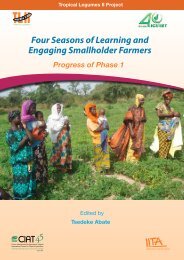Four Seasons of Learning and Engaging Smallholder Farmers - icrisat
Four Seasons of Learning and Engaging Smallholder Farmers - icrisat
Four Seasons of Learning and Engaging Smallholder Farmers - icrisat
Create successful ePaper yourself
Turn your PDF publications into a flip-book with our unique Google optimized e-Paper software.
Infrastructure development at NARS<br />
The project provided some assistance in improving irrigation facilities to participating national research<br />
institutions. This support enabled the breeders to carry out <strong>of</strong>f season cowpea planting which made it<br />
possible to conduct phenotyping for drought tolerance, multiply seeds <strong>and</strong> also advance segregating<br />
generations. Planting during the dry season increased the number <strong>of</strong> generations that could be obtained<br />
each year thereby reducing the number <strong>of</strong> years needed for variety development <strong>and</strong> release.<br />
The supports provided were:-<br />
Mali:<br />
Niger:<br />
Nigeria:<br />
Support for irrigation at Cinzana station<br />
Support for irrigation at INRAN Maradi<br />
Upgrade <strong>of</strong> irrigation at Minjibir<br />
Mozambique: Irrigation set up in Gurue <strong>and</strong> Zambesia<br />
Tanzania:<br />
Fixing <strong>of</strong> water pump at ARI Ilonga station<br />
Some outcomes<br />
• At least two improved breeding lines were selected in each country with PVS. At may locations the<br />
selected lines performed better than farmers’ varieties especially where drought occurred;<br />
• Seeds <strong>of</strong> the selected lines have been multiplied <strong>and</strong> supplied to farmers for planting in demonstration<br />
plot;<br />
• Crosses have been made between germplasm lines with enhanced levels <strong>of</strong> drought tolerance with<br />
improved breeding lines;<br />
• A number <strong>of</strong> segregating populations are being advanced from where selections will be made for<br />
new lines with better drought tolerance <strong>and</strong> other traits; <strong>and</strong><br />
• Students from Mozambique, Nigeria <strong>and</strong> Tanzania have been trained in plant breeding at MSc level.<br />
Cowpea early adoption study in Nigeria<br />
The study results revealed that, out <strong>of</strong> the total farmers that participated in the TL II project, in both<br />
Borno <strong>and</strong> Kano States, 75% adopted improved cowpea varieties, with the IT97K-499-35 being the<br />
most adopted followed by IT90K-277-2. Disaggregation <strong>of</strong> the improved cowpea adoption rates across<br />
the states by gender revealed a high adoption rate by men at 77%, <strong>and</strong> women farmers at 23%. The<br />
important factors that influenced the intensity <strong>of</strong> adoption <strong>of</strong> improved cowpea varieties among farmers<br />
included: use <strong>of</strong> fertilizer, use <strong>of</strong> chemicals, membership <strong>of</strong> cooperative organization, educational level<br />
<strong>of</strong> the respondents, farming experience <strong>and</strong> the frequency <strong>of</strong> extension visits all <strong>of</strong> which were positive.<br />
Most <strong>of</strong> the improved cowpea varieties were stored using the double <strong>and</strong> triple bagging (Hermetic)<br />
technology while the local varieties were stored using hermetic drum<br />
The following recommendations should enhance the development <strong>of</strong> effective policies for technology<br />
adoption:- i) emphasis be changed from demonstrating new technologies to one <strong>of</strong> facilitating farmers<br />
to test new technologies in their own environments; ii). gender mainstreaming in future project activities<br />
to facilitate participation by women which has the potential to influence their adoption <strong>of</strong> improved<br />
technologies; iii) community seed production should be encouraged <strong>and</strong> promoted to facilitate easy<br />
access to improved seeds; iv) policies should be designed to ensure that farmers have good access to<br />
fertilizers through adequate supply, <strong>and</strong> efficient distribution <strong>and</strong> v) policy, which provides adequately<br />
trained <strong>and</strong> equipped extension workers for disseminating extension messages to farmers should be<br />
promoted.<br />
Progress <strong>of</strong> Phase 1<br />
105

















